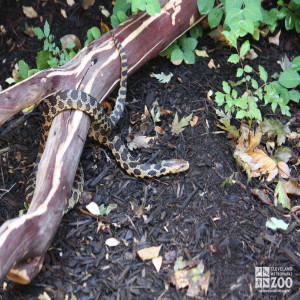Eastern Fox Snake
[Elaphe vulpina gloydi]

The length of the eastern fox snake is 3 to 6 feet with coloration of yellowish or light brown marked with bold chocolate-brown to black blotches down the midline of the back and tail. There are two alternate rows of smaller blotches on the sides. The belly is yellow with dark squarish blotches. A dark band runs from the eye to the angle of the mouth. A second band runs from eye to mouth. This snake is often mistaken for a copperhead.
Location: Animals Formerly at Zoo
Share:
Range
The range of the eastern fox snake is from extreme southern Canada, south to Indiana and west to Nebraska.
Habitat
The eastern fox snake inhabits rolling prairies, farmland, wooded streams, marshes, and dunes.
Conservation Status
Primary Threats
Gestation
Incubation: 55 to 70 days
Litter
Clutch size: 6 to 29 firm, leathery eggs
Behavior
Eastern fox snakes are excellent climbers but are usually seen on the ground near streams or marshes. When excited they often assume an S-shape with mouth open and vibrate their tails on surface litter, sounding like a rattlesnake. They may gather in large numbers at favored hibernation sites, usually abandoned rock-walled wells.
Reproduction
Mating of eastern fox snakes is from April to July. The female lays eggs from late June to early August. The young, 10 to 13 inches in length, hatch from late August to October.
Wild Diet
Meadow voles, deermice, eggs, fledgling birds, newborn rabbits
Zoo Diet
Pre-killed mice and chicks
